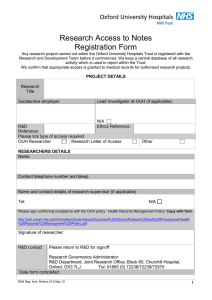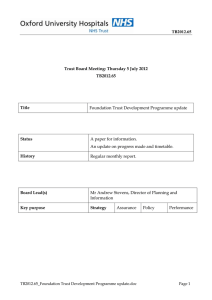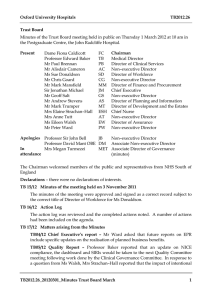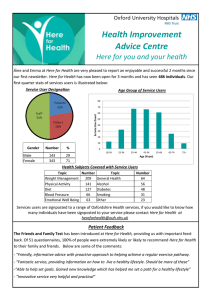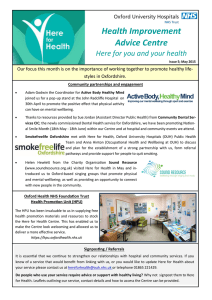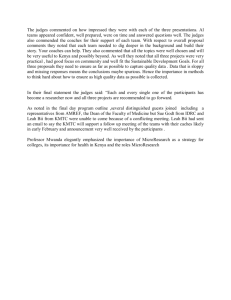Oxford University Hospitals TB2012.11 Trust Board
advertisement
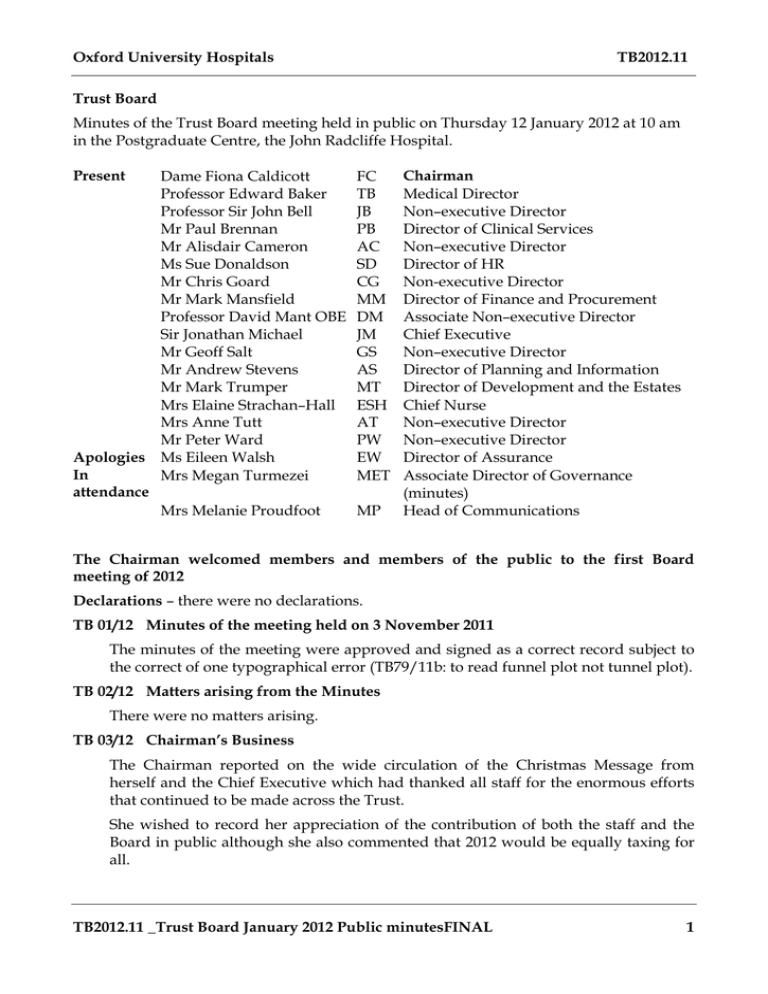
Oxford University Hospitals TB2012.11 Trust Board Minutes of the Trust Board meeting held in public on Thursday 12 January 2012 at 10 am in the Postgraduate Centre, the John Radcliffe Hospital. Present Dame Fiona Caldicott Professor Edward Baker Professor Sir John Bell Mr Paul Brennan Mr Alisdair Cameron Ms Sue Donaldson Mr Chris Goard Mr Mark Mansfield Professor David Mant OBE Sir Jonathan Michael Mr Geoff Salt Mr Andrew Stevens Mr Mark Trumper Mrs Elaine Strachan–Hall Mrs Anne Tutt Mr Peter Ward Apologies Ms Eileen Walsh In Mrs Megan Turmezei attendance Mrs Melanie Proudfoot FC TB JB PB AC SD CG MM DM JM GS AS MT ESH AT PW EW MET MP Chairman Medical Director Non–executive Director Director of Clinical Services Non–executive Director Director of HR Non-executive Director Director of Finance and Procurement Associate Non–executive Director Chief Executive Non–executive Director Director of Planning and Information Director of Development and the Estates Chief Nurse Non–executive Director Non–executive Director Director of Assurance Associate Director of Governance (minutes) Head of Communications The Chairman welcomed members and members of the public to the first Board meeting of 2012 Declarations – there were no declarations. TB 01/12 Minutes of the meeting held on 3 November 2011 The minutes of the meeting were approved and signed as a correct record subject to the correct of one typographical error (TB79/11b: to read funnel plot not tunnel plot). TB 02/12 Matters arising from the Minutes There were no matters arising. TB 03/12 Chairman’s Business The Chairman reported on the wide circulation of the Christmas Message from herself and the Chief Executive which had thanked all staff for the enormous efforts that continued to be made across the Trust. She wished to record her appreciation of the contribution of both the staff and the Board in public although she also commented that 2012 would be equally taxing for all. TB2012.11 _Trust Board January 2012 Public minutesFINAL 1 Oxford University Hospitals TB2012.11 She said that Mr Mike Fleming, Director at the Horton General Hospital would be retiring in March after 40 years. She wished to put on record her thanks and appreciation of his contribution in a number of roles to the Trust over the last 28 years. TB 04/12 Chief Executive’s report The report was considered and the following points noted: 1. The Board recorded its congratulations to Professor Tarassenko who had been awarded a CBE in the New Year’s Honours list. 2. The Supported Discharge Service (SDS) was now in place; this was a new approach to reduce delayed transfer of care with the OUH being funded to support patients in their own homes rather than in acute beds. This would both improve the quality of care for patients, reduce the number of delays and improve the flow through the OUH’s beds. It was intended that the SDS would ultimately be supporting 80 patients in the community (hopefully by April 2012). Support was initially for 14 days with care then transfer to Social Services. However, it was recognised that it was important to ensure that patients continued to receive the right care and that delays continued to be monitored; Mr Brennan confirmed that all patients had then received their support from Social Services. 3. The change in position of the Independent Sector Treatment Centre was noted. OUH staff would no longer be seconded to this; the priority was to improve the 24/7 services at the Horton. 4. The Board noted that the options for the relocation of the head and neck cancer services should be considered at the March meeting. This would allow additional time for consultation and discussions with key stakeholders and meetings were already underway. 5. The Board noted the current position on EPR. Mr Salt thanked Mr Stevens and the team for all the efforts that had been put into the implementation that had gone well although it had not been without some problems. Sir Jonathan commented that there had been some technical issues, although fewer than expected; preparation and training had been excellent and the impact on patients and staff had been largely mitigated. 6. Mr Stevens highlighted a number of areas: a. Technical system problems were being picked up, reviewed and dealt with swiftly; b. More than 3000 people had been trained on the system; c. Work was now being done to explore the benefits to be gained from using the system in terms of improving work patterns and changing the way in which work was done. TB2012.11 _Trust Board January 2012 Public minutesFINAL 2 Oxford University Hospitals TB2012.11 d. There had been a significant problem with the patient call centre which had been resolved for the short term but steps were already being taken to address the issues through redesign of the system and the way in which the administration processes worked. e. Issues and problems were being monitored weekly with the use of a dashboard and additional resource was being made available to ensure issues could be resolved quickly. In addition, experiences from other sites, e.g. Winchester, were being helpfully drawn up on. f. The next four to six weeks would be crucial as the system bedded down into ‘business as usual’. Sir John Bell stressed the importance of being clear about the business objectives and benefits to be gained from the system and he asked when the Board might see a plan for the delivery of cost savings and the other benefits. Mr Stevens said that three months was being allowed for the system to stabilise but that the executive team was already considering the next phase involving the redesign of administrative processes, drawing on the capabilities of the system, and the clinical roll out. Mr Mansfield and Mr Stevens confirmed that work was being done currently on operationalizing the system, realizing the benefits and using appropriate metrics to monitor delivery. Sir John stressed the importance of being able to measure defined parameters and to see productivity improvements. Professor Baker commented that quality improvements will also come through the further clinical roll out of the system and the audit potential of the system. Regular updates would continue to be provided to the Board. AS TB 05/12 Quality Report The Board reviewed the Quality Report and the following points were highlighted by Mrs Strachan-Hall and Professor Baker in their introduction to the report: 1. Staffing levels on the wards remained stable and safe; the number of patient feedback reports had increased with an increase in positive comments; the new complaints structure was due to be implemented shortly. 2. No update for the SHMI was available but this was expected shortly. Infection rates remained within the extremely tight targets. This reflected the hard work being done across the Trust to ensure that infections were kept at a minimum. However, it was noted that similarly challenging targets were likely to be in place for 2012/2013 for both MRSA and C.Diff. In discussion on the report the following points were made: 3. Mr Cameron asked how the team would be tackling the recent points made by the Prime Minister on nursing. Mrs Strachan-Hall responded that intentional rounding was now being rolled out and nurses were also keen to make sure that inspections/visits resulted in benefits for patients. TB2012.11 _Trust Board January 2012 Public minutesFINAL 3 Oxford University Hospitals TB2012.11 In addition, a further impetus would be provided to the Productive Ward programme. In terms of overall performance, she judged that the OUH was in the middle of providers but that real improvements would be the aim. Sir Jonathan stressed the importance of intentional rounding delivering real benefits for patients, rather than being just a tick box exercise. 4. Professor Mant commented on the two SIRIs relating to overdose but noted that these were very different situations now under detailed investigation. He also commented on how compliance with NICE guidance was being monitored, particularly in the light of plans to change the status. Professor Baker said that there were two levels: the policy within the OUH being compliant and then the audit and monitoring of compliance. The new audit arrangements being put in place following the corporate restructures were aimed at prioritising reviews of compliance on a systematic programme basis. The potential of EPR in this was being explored. Mrs Tutt asked that results from recommendations arising from reviews of compliance be brought back to the Board. Professor Baker commented that recommendations were monitored and reported through on an exception basis. It was agreed that a sensible way for the Board to be informed would be through the minutes of the Quality Committee. EB 5. Mrs Tutt asked that information on learning from SIRIs be included in future reports. This would be actioned for the next month’s report. In addition, the Board noted that further information was included in the regular reports to the Quality Committee. ESH 6. Sir John highlighted the planned changes to the status of NICE guidance and the importance of this not only for providers but particularly for Commissioners who would have to resource mandatory compliance. 7. Mr Ward commented that intentional rounding did take time but that it could also save time with the early identification of issues and potential problems. It was noted that level 7 at the John Radcliffe Hospital was a key area for focus given the activity levels and turnover of patients. Mrs Strachan-Hall said that safe care was being maintained with the support of agency staff. Staffing levels were reviewed twice a day and adjustments made. 8. He asked about the use of the NHS Safety Thermometer and whether this was being used within the Trust. Mrs Strachan-Hall responded that the OUH had contributed to its development and a number of the key metrics, e.g. VTE rates, catheter infections, pressure ulcers and falls, were reported through the Quality report. However, the development of the new integrated performance report and dashboard would bring together key metrics at a number of levels of granularity for the Board and across the Trust. TB2012.11 _Trust Board January 2012 Public minutesFINAL 4 Oxford University Hospitals TB2012.11 9. Mr Ward welcomed the reduction in RIDDOR reportable incidents. The Board welcomed the real improvements in needlestick injuries which would continue as the price of the safer devices continued to fall. 10. Mr Salt welcomed the rise in all as well as positive comments in November but looked forward to continued increases and information on plans to deliver actions. He asked that Mrs Strachan-Hall bring back a report on this to either the March Board or the March Quality Committee. ESH 11. He was particularly keen to see information on the outcome measures that could be used and drawn on to continue quality improvements. Professor Baker commented that was being done currently on developing a basket of outcome measures for the services. These would include both national measures and internally developed measures relevant to the services. This would be brought back to the Quality Committee for review and linked closely to the work on the integrated performance report now underway.EB/ESH The report was received. At this point Dame Fiona commented on and welcomed the new format and cover papers for the Board reports. These were very helpful. TB 06/12 Foundation Trust update – Membership Strategy The Board then considered the update on the development of the Membership Strategy in support of the Foundation Trust application. The first draft Integrated Business Plan (IBP) had been submitted for review by the SHA. This covered a number of areas including clinical services developments and governance. The Membership Strategy was a required appendix to the IBP and had been developed using two key principles agreed by the Board: namely: 1. building a substantial and representative membership to take forward the Trust’s strategy, to support public accountability and local engagement, and to develop a more outward-looking organisation; 2. the belief that a well-informed, motivated and engaged membership will help it to be a more responsive organisation with an improved understanding of the needs of its patients and local communities. The work in developing engagement and members was agreed as a crucial part of the OUH’s approach and would help support the delivery of FT status and wider transformation across the organisation as a whole. In response to a question fromMr Ward, Mr Stevens confirmed that engagement was already taking place with current members and that this work would ‘gear’ up during the next months following approval of the strategy. The Board considered the recommendations and agreed the following: 3. the benefits of membership as set out in paragraphs 9 to 19; 4. the objectives of membership as set out in paragraph 23 of the strategy; TB2012.11 _Trust Board January 2012 Public minutesFINAL 5 Oxford University Hospitals TB2012.11 5. the transition of the current Patient Panel to the membership; this work would be taken forward shortly by Mrs Strachan-Hall; 6. the proposed constituencies (para 38 and 39); 7. the age limit of 16 for membership (para 40); noting also the plans to continue active engagement with younger people and to create a younger people’s membership; 8. the target membership numbers as set out in paragraph 48; and 9. the proposals for the Council of Governors as set out in paragraph 57. The Board adopted the Strategy and looked forward to further reports on the work now to be taken forward, noting also that discussions would be held with key stakeholders, including a meeting with the JSNCC which would be held before the formal consultation process took place in the summer of 2012. AS The Board also noted that the membership strategy would be reviewed in the light of the outcome of the consultation and amended appropriately. TB 07/12 Delivering compassionate excellence through staff engagement Ms Donaldson introduced the report which had been the subject of discussion and debate at the Board and across the organisation and with the Patient Panel. It would be key now to agree the values for the OUH and to take these forward into action across a wider range of activities including recruitment (working with the NSPCC) and performance management as well as the delivery of care. The action plan set out the programme of work which would also take account of the outcome from the 2011 staff survey due in March 2012. Mr Cameron challenged the length and possible complexity of the proposed values and whether these could be real drivers for change. He suggested that perhaps simplification might help. Sir Jonathan commented on the time spent in debating the words and stressed the importance of capturing the range and scope of areas to be covered. The key words for focus would be delivery, compassion and excellence; Mr Salt agreed that these would be key. Mr Goard commented that the Board members had a real responsibility to support the delivery of these values, particularly in the next steps of values into action. Professor Baker agreed that the work now needed to embed values would be crucial and the Board needed to ensure that the right messages were given to staff that also took account of their feedback and input. The Board recognised the importance of the next phase of the work and its role in that. It noted the importance of engagement across all the divisions and corporate areas in driving the work forward. All areas had a responsibility to support delivery. Mrs Strachan-Hall said that many areas and staff groups were now very keen to work to the next phase of delivery. The Board welcomed the work done and 10. agreed the values as set out in paragraph 15; and TB2012.11 _Trust Board January 2012 Public minutesFINAL 6 Oxford University Hospitals 11. TB2012.11 agreed the recommended next steps as set out in paragraphs 16 to 19 noting the action plan summary set out in Appendix 1. Dame Fiona said that in her view Appendix 4 – What do I expect as a patient? was really important and its contents should be used in the forthcoming work. Mrs Strachan-Hall said that she believed that this had been prepared by a member of the Patient Panel. Ms Donaldson confirmed that this would be utilised if the member of the Panel agreed. SD Dame Fiona wished to record her thanks to all those involved in this work, including the Patient Panel and the many staff groups who had contributed. She thought that it had been a very successful piece of work with great potential for the organisation. The Board also recorded its appreciation of the work done by Mrs Kate Thorpe in organising and coordinating the process. SD TB 08/12 Operating Framework 2012/2013 The Board considered the Operating Framework and associated documents setting out the PCT allocations for 2012/2013, the PbR tariff and the expectations of NHS South of England. Three key areas had been highlighted by the NHS Chief Executive: • getting the basics right every time; • maintaining a grip on performance; • meeting the quality and productivity challenge. The Board noted the financial and productivity challenges for 2012/13 and beyond, including the impact of the tariff in mid-December and the 4% efficiency gains. The NHS South of England documents set out the expectations on organisations for the ‘how’, highlighting key planning deadlines, the central role of clinical commissioning groups and the changes in specialist commissioning. This latter point would be of crucial and strategic importance to the OUH. Mr Salt asked how the Board would be assured that such a complex set of requriements and deliverables were being captured, monitored and delivered, particularly during the FT application process. Mr Mansfield confirmed that this was indeed a key question and he, Mr Brennan and Mr Stevens were charged with bringing this together. Discussions continued to be held with the Divisions and in the Trust Management Executive on the ‘how’. A meeting was to be held with the NHS South of England later in the month to work through the crucial and interlinking plans for the OUH, including the FT application timeline. Mr Brennan reported that the work now being led by Mrs Sarah Randall, the Deputy Director of Clinical Services, on the integrated performance report was intended to ensure that all the necessary performance metrics were included and presented to the Board in such as way as to assure it, the SHA and the DH that the OUH was delivering. Mr Stevens stated that the intention, in line with the Operating Framework and criteria for FT was that a compliant contract for 2012/13 be agreed. TB2012.11 _Trust Board January 2012 Public minutesFINAL 7 Oxford University Hospitals TB2012.11 However, it was also noted that the OUH needed to take account of some of the unintended consequences of items within the framework, including the use of the new 111 number and the impact of the current algorithm on the services in Oxfordshire. This had already been picked up for resolution. Professor Mant welcomed this. The Board noted the proposals outlined for commissioning and the potential for changes in boundaries. This was potentially complicated and changes in definitions and commissioning arrangements for specialist services could impact on the OUH. Clarification and additional information on the possible changes and hence impact on the OUH was being sought; Sir Jonathan commented some changes could be positive. Mr Stevens highlighted risks in the funds available that could follow from changes in, for example, any reduction in the commissioning base for Oxfordshire. In response to a question from Mr Ward, it was noted that legacy debt was not likely to impact on Oxfordshire but that it might have a marginal impact on West Berkshire. Dame Fiona asked that all Board members familarise themselves with these important documents. Briefings and updates would continue to be provided to NEDs in support of this. MM/AS/PB The Board received and noted the Operating Framework 2012/2013 and the supporting papers. TB 09/12 Operational performance Month 8 Mr Brennan presented the report, highlighting the achievement of standards for Q3 although DTOCs remained high with 172 across the system with the consequenct operational impact. The length of stay was also rising although the Board welcomed the improvement in weekend discharges. In response to points made by Mr Cameron and Mr Ward, Mr Brennan confirmed the current focus on weekend discharges and ward rounds to also ensure swift discharges early in the week. Data for discharges under 48 hours and between 2 and 2.5 days were also being isolated for analysis. However, it was clear that the DTOCs were impacting on lengths of stay overall. Mr Goard wondered if the increases in length of stay included stays for clinical care. It was noted that length of stay excluded the acutely ill patients on, for example, ITU. The Board noted that future reports (intended from April 2012) would reflect the work on the integrated performance report described earlier. The Board received the report. TB 10/12 Financial performance Month 8 Mr Mansfield presented the report highlighing the forecast year end position and the improvement in the in month position compared to month 7. Work continued with the Divisions on mitigating actions to ensure delivery of agreed financial plans. Mrs Tutt asked whether the capital programme was being delivered and noted that the TME had agreed a plan for delivery to the end of March. In addition, Mr TB2012.11 _Trust Board January 2012 Public minutesFINAL 8 Oxford University Hospitals TB2012.11 Mansfield confirmed that the impact on the year end and cash management was being considered and discussions continued with the Auditors in advance of the year end. The Board received the report, noting the month position and the forecast position to the year end. TB 11/12 Minutes of Board Committee meetings Mr Cameron presented the minutes of the Audit and Finance Committee, highlighting work being done on both internal and external audit and counter fraud services. A further additional meeting was to be held to consider the terms of reference and future workplans. The Committee also thought that the terms of reference might be amended in relation to the review of financial plans as this was considered to be the role of the full Board. The Board noted and received the minutes of the Audit and Finance Committee. Mr Salt presented the minutes of the Quality Committee highlighting the successful introduction of patient stories and the actions being taken to address the issues raised. Work throughout the year had focused on the role of the Committee, the content of its reports, particularly in terms of information and the provision of assurance. Further work would be done for the March meeting; he would be meeting shortly with Mrs Strachan-Hall and Ms Walsh to develop this. Key items for discussion would include the updated Board Assurance Framework and the Risk Register. This would provide a firm and strong platform to move into the new year. The Board noted and received the minutes of the Quality Committee. TB 12/12 Consultant Appointments and Sealings The Board noted the consultant appointments and recent signings and sealings. TB 13/12 Any other business There was no other business TB 14/11 Date of the next meeting The next meeting of the Board to be held in public will be on Thursday 1 March 2012 at 10.00 am. The Board then considered and agreed the following motion: “that representatives of the press and other members of the public be excluded from the remainder of the meeting, having regard to the confidential nature of the business to be transacted, publicity on which would be prejudicial to the public interest (Section 1(2) of the Public Bodies (Admissions to Meetings) Act 1960)” TB2012.11 _Trust Board January 2012 Public minutesFINAL 9
